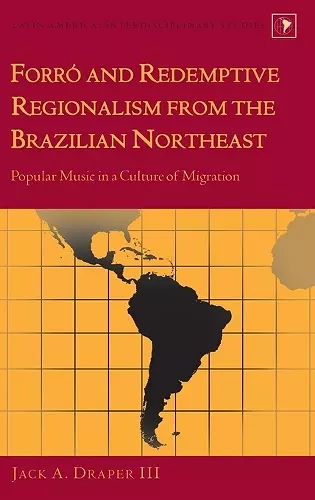Forró and Redemptive Regionalism from the Brazilian Northeast
Popular Music in a Culture of Migration
Jack A Draper, III author Gladys M Varona-Lacey editor
Format:Hardback
Publisher:Peter Lang Publishing Inc
Published:16th Sep '10
Currently unavailable, and unfortunately no date known when it will be back

For the many poor and working-class Northeastern Brazilians who have been displaced from their home region for economic reasons, the music of forró is a redemptive attempt at establishing an immanent relationship to history and community in the diaspora. The redemption explored in this book is multifaceted, including a desire to return home as part of a larger workforce in a sustainable economy, the desire to see the region’s rich culture celebrated throughout Brazil, and to ensure that its traditional legacies are both preserved and further enriched through respectful innovation. The acute perceptiveness of forró musicians in portraying the diasporic experience of Northeastern Brazilians is elaborated in various chapters, including: one chapter focused on lyrical, musical, and collective representations or manifestations of diasporic nostalgia (saudade), another chapter analyzing the lyrico-musical representation of rural workers’ alienation from – and resistance to – life in the urban centers, and a third chapter which contextualizes forró’s descriptions of the experiences of Brazil’s internal migrants, utilizing an array of testimonials and academic studies on the subject of interregional migration to reveal both the wisdom of forró lyricists and some of their blind spots. The study also includes a historical analysis of this Northeastern genre’s transformation from a rhythm called baião that symbolically represented the Northeast as a simple, coherent entity, to forró, a more allegorical representation with a greater appreciation for the class, gender, racial, and generational complexity of the region. The development of the genre, as well as the circulation of theory related to cultural production and identity, are contextualized in a global economy.
«This book presents a coherent, well-researched, and highly insightful analysis of ‘forró.’ Jack A. Draper’s exploration of the workings of saudade in the genre, his analysis of forró’s relationship to patterns of migration and assimilation, and his critical division of the current field of forró into three distinct styles are excellent. As Draper notes, forró has received less scholarly attention than other Brazilian genres of similar popularity and substance. It is a major cultural phenomenon whose growth and recombination over the past seventy years present fascinating cases of cultural vitality and variation, and it amply deserves the close critical attention it gets here.» (Bryan McCann, Georgetown University, Author of ‘Hello, Hello Brazil: Popular Music in the Making of Modern Brazil’)
«In this book, Jack A. Draper very accurately analyzes the trajectory of the musical genre known as ‘forró’, examining this music as one of the elements of cultural expression of the people of Brazil’s Northeastern region. It is a historiographical analysis that delves into the fields of sociology and anthropology, not forgetting references from the regional literature. Draper interprets signifiers and signifieds contained in the song lyrics, exploring scenarios which present the life and way of being of the artists, of the Northeastern poets that reside in the region and of those who migrated to the great cities and have in forró their greatest reference of sociocultural identity. It is a work that deals with popular musicality from the standpoint of a researcher who left behind his habitat – the United States – to go to the field. In Brazil he experienced and witnessed Northeastern customs, habits, and traditions, but it is his object of study forró that consolidates this work.» (Expedito Leandro Silva, University of Santo Amaro, Brazil, Author of ‘Forró no asfalto: mercado e identidade sociocultural’)
ISBN: 9781433110764
Dimensions: unknown
Weight: 440g
226 pages
New edition